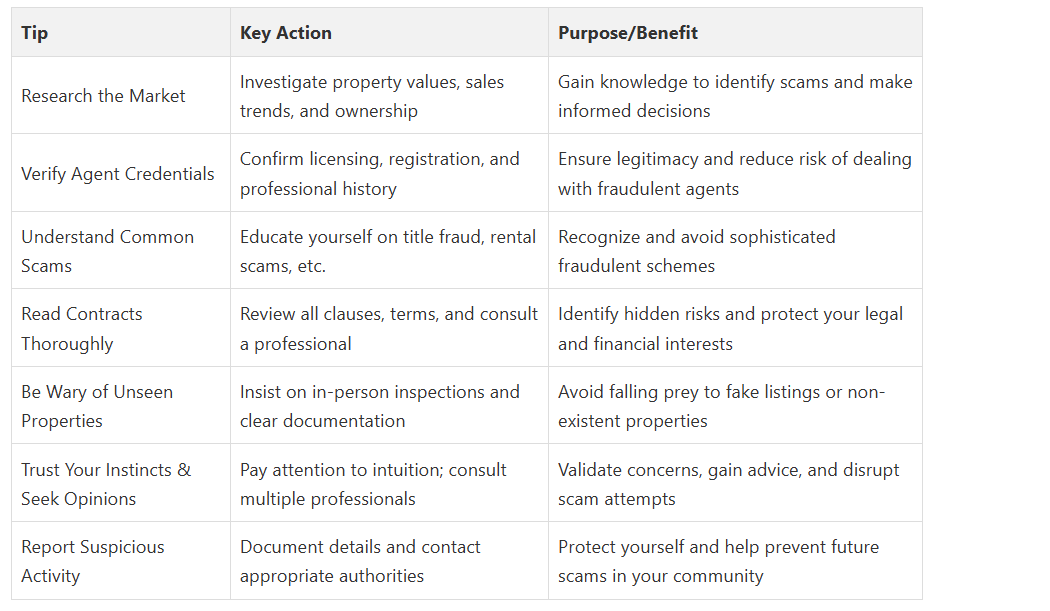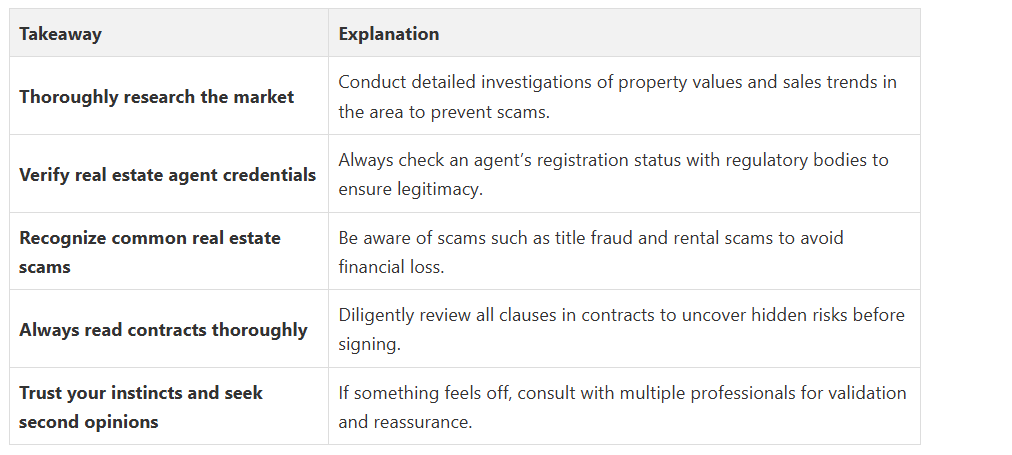
Avoiding Real Estate Scams
Real estate scams in Toronto, Oshawa, Whitby, Ajax, and Pickering are not just rare scams targeting the unwary. Last year, fraudulent real estate transactions in Canada topped $530 million, according to the Canadian Anti-Fraud Centre. You might think you could spot a con from a mile away, but even experienced buyers have lost thousands to clever schemes in seemingly safe markets. That number keeps rising because fraudsters are using tactics you probably have never even considered.
Table of Contents
- Research The Market Before You Engage
- Verify Credentials Of Real Estate Agents
- Understand Common Real Estate Scams
- Always Read Contracts Thoroughly
- Be Wary Of Unmarked Or Unseen Properties
- Trust Your Instincts And Seek Second Opinions
- Report Suspicious Activity To Authorities
Quick Summary
1: Research the Market Before You Engage
Researching the market goes far beyond casual browsing. Professional due diligence requires a comprehensive investigation of current property values, recent sales trends, and neighbourhood-specific information. For instance, examining historical price fluctuations in specific Durham Region neighbourhoods can reveal unusual patterns that might signal potential scam activities.
Key research strategies to protect yourself include:
- Verifying property ownership through official land registry records
- Checking historical sale prices and comparative market analyses
- Investigating the reputation of sellers, agents, and real estate companies
Professional real estate services like Fanis Makrigiannis Realty recommend utilizing multiple information sources. Local municipal records, online property databases, and professional real estate networks can provide comprehensive insights. Cross-referencing information from different sources helps validate property details and identify potential red flags.
Understanding market value requires more than just checking listing prices. Analyze recent comparable sales, assess neighbourhood development trends, and consult local real estate professionals who understand the nuanced dynamics of Toronto and Durham Region markets. This comprehensive approach significantly reduces your vulnerability to potential real estate scams.
Remember, knowledge is your most powerful defence. A well-researched approach transforms you from a potential victim into an informed, confident property investor or homebuyer.
2: Verify Credentials of Real Estate Agents
As a Real Estate Agent in Oshawa, Fanis Makrigiannis understands the importance of professional verification. Discover more about our commitment to professional ethics, which emphasizes the importance of transparent and credible representation.
According to The Canadian Real Estate Association, legitimate real estate agents must be registered with provincial regulatory bodies. In Ontario, this means being a licensed member of the Real Estate Council of Ontario (RECO).
Critical verification steps include:
- Checking the agent’s active registration status with RECO
- Confirming membership in professional organizations like the Canadian Real Estate Association
- Reviewing their professional history and any potential disciplinary actions
Beyond official registration, consider examining an agent’s professional track record. Years of experience in Toronto and Durham Region, client testimonials, and a transparent portfolio of successful transactions are strong indicators of reliability.
Remember, a genuine real estate professional will never discourage you from conducting due diligence. Your right to verify credentials is paramount in protecting yourself from potential fraudulent activities in property transactions.
By meticulously verifying an agent’s credentials, you significantly reduce the risk of falling victim to real estate scams and ensure a secure, professional property buying or selling experience.
3: Understand Common Real Estate Scams
Explore our guide on avoiding mortgage scams to gain deeper insights into protecting your investments.
According to FBI Real Estate Fraud Reports, real estate scams have become increasingly sophisticated, targeting unsuspecting buyers and sellers across North America.
Common real estate scams that demand your vigilance include:
- Title fraud, where scammers illegally transfer property ownership
- Rental scams involving fake listings or non-existent properties
- Foreclosure rescue schemes targeting vulnerable homeowners
- Wire transfer fraud during transaction processes
- Fake investment opportunities with unrealistic returns
As a Real Estate Agent in Oshawa, Fanis Makrigiannis Realty recommends treating any deal that seems too good to be true with substantial skepticism. Unusual pressure tactics, requests for upfront payments, and demands for immediate action are significant warning signs.
Financial transactions in real estate require meticulous verification. Always confirm property details through multiple independent sources, scrutinize documentation, and never transfer funds without comprehensive validation.
Professional real estate services can provide an additional layer of protection. Experienced agents understand local market nuances and can help identify potential red flags that might not be apparent to individual buyers or sellers.
Remember, protecting yourself isn’t about being paranoid—it’s about being methodical, informed, and proactively cautious in every real estate transaction.
4: Always Read Contracts Thoroughly
Learn about the legal basics for buyers and sellers to understand the nuances of real estate documentation.
According to Legal Experts at the Canadian Bar Association, understanding every clause in a real estate contract is fundamental to protecting your interests.
Key areas requiring meticulous attention include:
- Contingency clauses and their specific conditions
- Financial terms and payment schedules
- Property condition and inspection details
- Potential hidden fees or additional costs
- Termination and penalty conditions
While contract language can seem intimidating, breaking down each section systematically helps uncover potential red flags. Watch for vague terminology, unusual conditions, or clauses that seem overly complex or one-sided.
Consider engaging a legal professional who specializes in real estate transactions. Their expertise can provide an additional layer of protection, helping you navigate intricate contractual language and identify potential risks that might not be immediately apparent.
In the Durham Region market, where property transactions can be complex, taking time to thoroughly understand contract details is not just recommended—it’s essential. Rushing through documentation or feeling pressured to sign quickly are significant warning signs of potential fraudulent activity.
Remember, a legitimate real estate transaction welcomes careful review. Any resistance or attempts to rush you should immediately trigger suspicion. Your diligence in reading contracts is your most powerful tool in preventing real estate scams.
5: Be Wary of Unmarked or Unseen Properties
Understand real estate terminology to protect yourself and recognize potential manipulation tactics used by fraudulent sellers.
According to the Ontario Real Estate Association, legitimate property transactions always involve transparent, verifiable property access and documentation.
Warning signs of potential property scams include:
- Sellers refusing in-person property inspections
- Properties listed without clear location details
- Excessive digital-only representations
- Pressure to make decisions without physical verification
- Incomplete or vague property documentation
Professional real estate services recommend comprehensive property verification strategies. Never commit financial resources to a property you cannot physically examine or independently verify. This means scheduling personal inspections, requesting comprehensive documentation, and cross-referencing property records with municipal databases.
In the Durham Region market, where property values can vary significantly between neighbourhoods, understanding the physical property context becomes even more critical. Unmarked or inaccessible properties should immediately trigger your skepticism.
Technology has transformed real estate transactions, but it has also created opportunities for sophisticated fraudulent schemes. Virtual tours and online listings can be compelling, but they should never replace direct, physical property assessment.
Remember, a genuine seller will always welcome and facilitate a thorough property inspection. Any resistance or complex excuses for preventing direct property verification should be considered a significant warning sign in your real estate transaction journey.
6: Trust Your Instincts and Seek Second Opinions
Learn about maintaining client confidentiality and professional ethics to understand the importance of transparent professional relationships.
According to Psychology Today’s Decision Making Research, human intuition is often a sophisticated subconscious processing of complex information that should not be ignored.
Critical indicators that warrant seeking additional perspectives include:
- Feeling pressured to make immediate decisions
- Sensing inconsistencies in the provided information
- Experiencing unexplained discomfort about a transaction
- Noticing significant discrepancies in property details
- Encountering resistance to your questions or concerns
Financial advisors, independent real estate agents, legal professionals, and experienced investors can offer valuable perspectives that might reveal hidden risks or confirm your initial concerns.
Scammers often rely on isolating their targets, making them feel uncertain and alone. By actively seeking diverse professional opinions, you disrupt their manipulation strategies and create a robust verification network.
Remember, trusting your instincts does not mean acting on fear, but approaching real estate transactions with informed caution.
If something feels fundamentally wrong, pause, investigate, and seek additional perspectives before proceeding.
7: Report Suspicious Activity to Authorities
According to The Canadian Anti-Fraud Centre, reporting suspicious activities helps law enforcement track and prevent broader criminal networks.
Important authorities and reporting channels include:
- Local municipal police departments
- Ontario Provincial Police fraud division
- Canadian Anti-Fraud Centre
- Real Estate Council of Ontario (RECO)
- Financial Transactions and Reports Analysis Centre of Canada (FINTRAC)
When reporting, be prepared to provide:
- Detailed timeline of interactions
- Names and contact information of involved parties
- Copies of relevant documentation
- Specific details about suspicious activities
- Any financial transactions or communications
In the Durham Region market, collaborative reporting helps create a more transparent and secure real estate environment. Each report contributes to a broader understanding of emerging fraudulent tactics.
Remember that anonymity and protection are prioritized in fraud reporting systems. Professional authorities understand the sensitive nature of these disclosures and have established confidential reporting mechanisms.
By taking action and reporting suspicious activities, you become an active participant in maintaining the integrity of real estate transactions, protecting not just yourself but the entire community from potential fraudulent schemes.
Below is a comprehensive table summarizing the seven essential tips to avoid real estate scams discussed in the article, including main actions and the key purpose of each tip.

Trust Your Real Estate Journey to Local Expertise and Secure Solutions
Take the next step and turn knowledge into action. Explore our Home Buying and Selling Guides for clear legal basics, or use our Contact Page to connect directly with Fanis for personalized help. Protect yourself by choosing a local expert who puts your safety and goals first. Visit https://fanis.ca today and start your transaction with confidence.
Frequently Asked Questions
What should I look for to verify the credentials of a real estate agent?
What are some common real estate scams to be aware of?
Why is it important to read contracts thoroughly?
Contact me personally to learn more.
About the author:
Fanis Makrigiannis is a trusted Realtor with RE/MAX Rouge River Realty Ltd., specializing in buying, selling, and leasing homes, condos, and investment properties. Known for his professionalism, market expertise, and personal approach, Fanis is a Real Estate agent in the Durham region and is committed to making every real estate journey seamless and rewarding.
He understands that each transaction represents a significant milestone and works tirelessly to deliver outstanding results.
With strong negotiation skills and a deep understanding of market trends, Fanis fosters lasting client relationships built on trust and satisfaction.
Proudly serving the City of Toronto • Ajax • Brock • Clarington • Oshawa • Pickering • Scugog • Uxbridge • Whitby • Prince Edward County • Hastings County • Northumberland County • Peterborough County • Kawartha Lakes
Fanis Makrigiannis
Real Estate Agent
RE/MAX Rouge River Realty LTD
(c): 905.449.4166
(e): info@fanis.ca
Recommended
8 Essential Property Management Tips for Homeowners - Fanis Makrigiannis Realtor®
Avoiding Common Mistakes When Purchasing a Home in Ontario - Fanis Makrigiannis Realtor®
7 Essential Home Maintenance Checklist Steps for 2025 - Fanis Makrigiannis Realtor®





